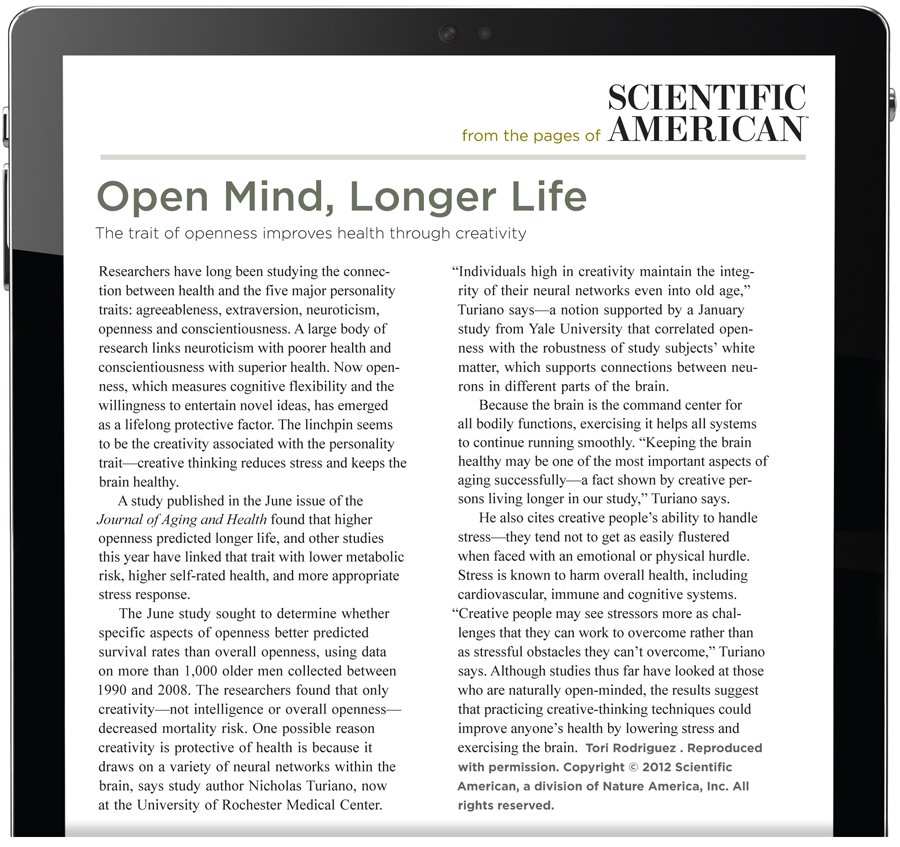Chapter 1. Chapter
Article
From the Pages of Scientific American
Open Mind, Longer Life

Click the image to enlarge. Click "Next" to continue.
1.1 Quiz
Question
YgSZ08YGvOhV93j3rGz9WmOE30GNgV2cKP7WYdOyloWXF1U5xYI8xJ1Rw2UIQJ73GVMfCdpO/xgvpVckkShv2+y53p9Rs6I9zWTy77rPSo5JIbmn9FDBoLhUMh1LXGChFgRTQmmXJZQbZkytfEJdLluf8dpeUr0sONnT6e8Z7ccTh0WSZFsG8jzuA7z3MMomGXP0UgVfPYtohHsrcuRMY4VFY/oLP/WS8Tql+aXVcRb9m0LBGWpXUB/sV1pf3TRjwRVY6oFR3IoPQvk6P0EIKydFYq0dujRzKdtGg2qlKvnTx0A1+iYxzMSeqkZlC9BFCorrect.
Incorrect.
Question
ifKS415yYQHjdH03zg4pQbYjRo6fdO7aEadpj6NJNFDIy0PzJjI9ujTccUJ+04fEahhbXzegDg4T8bibhq1uHk3aQD0Ve++MzMsuNjhvBlKfUMJrCcDBME5YOdKRRGHAeI87VAnMoKfqdNKOhTNsJPMmAqdxl7EYCf+U40NGvWoZESS/sf0jGAOgFUMaNFfx3X0jxGx4sRL3VLR0zzAobPjTKVUwesNzFB+0zGn4DECJPwuQgkfo8ZqlEQeCOcFpfhQIMwx6USoTviAkXMTZtDJsjEtpoqhe1MA5nOI9amdKYEeiapx6JDSq0e+CTRHxjU/s2mPQ8WTQS15cvJMjVghDaXTmciUHAmQZdWPs+OU=Correct.
Incorrect.
Question
uMSbS1ZDLywfCWDSDaGaJspEV6sZJVKzCcelY0szkpcMC2hI4F67bJJbdiAqV5juTDoJ4fA8abjBvL0agKHINS4lI9C5bZxxKXMUWUY7gVVfMwGaXpKPNOcD4YBZ+2ISVT80YyAfxzS5vu8jYEdlTo/Ni331cm1A9N8apx8F38gdJRrMkNw2OWqvcTswIJ3LbUVa5H7oNYdU9NBmACoHG4HaFSz+6S64+oJxeSz/nKD0w8zfwGKBvgyZBsqWVrc1l7O4NGurH9HM0PkFjqcZH8DbIyXUVUK8FmfJQ7Jj/gvM52rlXBsQIIdWI9m27eS2PfmoumGBK9p0TkJ6YmnkwSxtywyHwoGxG/KQE9rZg1fQxBUhag/qjTHtydbIuRLExAcmUg==Correct.
Incorrect.
Question
LypJiWWy2CHAhW3X2hZ29ux8eoflPDMEX1tBM9AlkUmcSrlB+PTk0nIL31abwdZa9Bj8oNwFZYFJBsoWvGSWuAoVBEERunc79Caswu8G/Gm4ItpgnORLh65cSFEEqQq44Qa3Zo7FSdlz7cwiF49bblhsv+PAlWcYuMYCpDjYo19bJjVf47JJg+anRHhnFqTv9krutS2FG6tnytMzdoRx226YhbG0Dg0dN96EWdVaJQsZTJh7JXH3q2DkCkk2YyFiB3p0NNaXx6UUZXNiHlbu3arxtylGzCQbaLL07vMkdKKHtbJrsma6ixVXWuV17eRV+arKGKrQjmDVY9avZbim2mDSHNMaAGrGgLv2VLpHUok47FsklXf8IQBHp+QR4PAJ+PfLcUft+kvorAqwNmIPIMVi+Uag+nx6OtNyLuEMUnZi/EW/BmV6lmOWRnELfe8HHt/AHaF3y7qubk2Rr71pykbxC1VSu1bUiqh272AZ7B53eQKeycjm6CvZnhSTNuboiocqet63pKgOljiB50xh1G98C5gykMekpFlqOjaKr20lv2i4DS9HCB2pN9QgGrXSCorrect.
Incorrect.
Question
t5Dc1ZBibgVr9l+9QnRLD26XYBOrvDPO3DDKOzx7bZ9QfHgU0eqAUeIUwhB/OAXXf9jUXBYMkT2yM0y0OV9MRb7tZWdWRTdTXXS1iUNc7oOOVQKsprvV/dRlkoF6MqsmPLwHz7ZglBeXePwVMKm22SWG3lN/ozRdoZaQ0NW6l0dvbe6whqWMpWgOIl8AVjYhZmQB88SFDNgXUULmIFhBZxH87Wt+u+1zI5DeTW0VqTlGzFAWGnSELJmcPXU+8jfwe7XUFoBa6/XTcvk0HuZgL/5mmgknn+h7h2rRyIOA0eLWGEXGKMh0ygmJZk81eSksdHZQOxA+s0BglkugFLVOUXUfoTS9+TmzIG7faUppa8rWfH/ZX9E2yC3omfS4dXFSnCVckTyzxqQLXWb/Q14KFQ3EJ1Yq6mz2Mh9/wYWxBhbq0roe5Wzcorx4+trTOk14NqrOW/QelTBAWTrnyq8YihCqnZkimYRk8vQpCU+2GuF8YAB/Wne8Q3j4iowHV2r6to8D2hwyS5qo7gBXbHqvT+YBAis1XvWyt3bDxGEbCJg+PoH9xhBU5/3fVo/R4Db67PDqFwn4tDHveNISauePxalukPKqTrcdo0LJVPdBImxqSsunFIwnuw==Correct.
Incorrect.